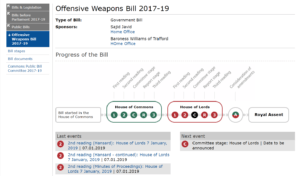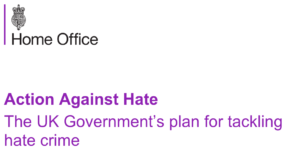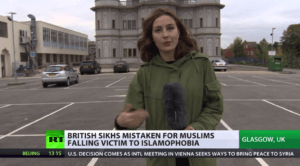Response to Home Affairs Committee Islamophobia inquiry
January 2019
About us: The Network of Sikh Organisations (NSO) is a registered charity no. 1064544 that links more than 130 UK gurdwaras and other UK Sikh organisations in active cooperation to enhance the image and understanding of Sikhism in the UK.
This submission follows evidence we provided to the Home Affairs Committee in 2017/18 for their inquiry into hate crime and its violent consequences.[i] [ii]
- Use of the word ‘Islamophobia’ v ‘anti-Muslim’ hatred
We believe use of the word ‘Islamophobia’ is deeply problematic because it is vague and ambiguous. In a recent House of Lords debate, our Director Lord Singh, dissected the disparate elements that are often referred to when ‘Islamophobia’ is discussed. He said, ‘…there are four distinct aspects of hate crime against Muslims that are collectively known as Islamophobia: hate crime arising from common prejudice; hate crime arising from assumptions about the teachings of Islam; hate crime arising from perceptions of Muslim behaviour; and hate crime against non-Muslims due to mistaken identity.’[iii] We are of the view that ‘anti-Muslim’ hatred, (like ‘anti-Sikh’ or ‘anti-Hindu’) is much clearer language to describe hate crime specifically against the Muslim community. We previously expressed this in written evidence to the APPG on British Muslims inquiry into a working definition of Islamophobia/anti-Muslim hatred.[iv]
1.1 Free speech and discussing matters of public interest
We have concerns that there are matters which extremists have an incentive to label ‘Islamophobic’ in order to shut down free and open discussion about matters of public interest – for example:
- Legitimate criticism of the behaviour of a minority of Muslims i.e. sexual grooming gang cases like in Rotherham, Rochdale, Oxford and Telford.
- Legitimate criticism of aspects of Islamic doctrine, like the sanctioning of death for apostates (ex-Muslims) for leaving Islam, reference to non-Muslims as kaffirs (a derogatory term), and persecution of homosexuals and minority Muslim sects like the Ahmadiyya.
- Legitimate criticism of the treatment of minority faiths in Muslim majority countries like Pakistan and Afghanistan. In the latter non-Muslims (like Hindus and Sikhs) are known to pay the jizya (tax of humiliation), and Christians often face blasphemy charges in Pakistan like the cause célèbre Asia Bibi. There are also reports of forced marriage and conversion of Hindu girls in Pakistan and persecution of Ahmadiyya.
- Free discussion about historical facts, like the beheading of the 9th Guru of Sikhism – Tegh Bahadur who was executed by Mughal authorities when he stood up for the freedom of religion of Hindu priests, who were being forcefully converted to Islam.
*the above isn’t an exhaustive list, but just a few areas as means of illustration.
We note the National Secular Society (NSS) have stated, ‘accusations of ‘Islamophobia’ are often used to silence debate about (and within) Islam,’[v] and ‘the word ‘Islamophobia’ has entered common usage, but it conflates legitimate criticism of Islam, or Islamic practices, with anti-Muslim prejudice, bigotry and hatred’.[vi] This view is entirely consistent with our position.
1.2 The definition proposed by the APPG on British Muslims
‘Islamophobia is rooted in racism and is a type of racism that targets expressions of Muslimness or perceived Muslimness’.[vii]
Questions about race component in definition
Conflating race and religion is extremely problematic. There are of course occasions where race motivates hate crime against Muslims, or the ‘Muslim looking other’. An example of this would be the throwing of a pig’s head in the drive of former government minister Parmjit Singh Dhanda’s in 2010. Although a Sikh, he does not wear a turban nor have a beard. His detractors must have assumed he was Muslim due to his ethnicity. However, in other cases, it is more the conflation of religious symbols, like the Sikh turban (dastaar) and beard with the appearance of extremists like Bin Laden, the Taliban (or ISIS), which makes Sikhs and other non-Muslims susceptible to ‘Islamophobia’.[viii] This vulnerability – due to a visibility in the public space, is no different to that of Muslim women in hijabs, and orthodox Jews in skullcaps. Dr Jhutti-Johal an academic from the University of Birmingham has provided further examples of hate crime against Sikhs in a submission to an inquiry by The Youth Select Committee in 2016.[ix] Notably, white hipsters with beards have been confused with ISIS, and this is more to do with their hirsute countenance, rather than a prejudice born from, or ‘rooted in racism’. Furthermore, by framing ‘Islamophobia’ as ‘racism’, the definition miserably fails to encompass prejudice suffered by white converts, or European Muslims, like Bosniaks, Kosovars and Albanians.
1.3 Evidence to APPG and the question of impartiality
Whilst our evidence, like that of Southall Black Sisters (SBS) and the NSS was accepted by the inquiry conducted by the APPG on British Muslims, not all was agreed in the definition. It was selectively used by the authors of Islamophobia Defined.[x] On aspects of SBS’s evidence, the report’s authors dismissively say it, ‘appears highly misguided’.[xi] We take the view this doesn’t reflect a standard of impartiality.
1.4 Being ‘insufficiently Muslim’ in the eyes of other Muslims
Baroness Falkner of Margravine gave a compelling speech in which she challenged the racial component of the proposed definition. She said, ‘When you define a religion—in other words, a belief system—as an adjective and declare that this is rooted in race, which is biological, you ascribe to belief an immutability which cannot work’.[xii] She also discussed the prejudice her family had faced moving from India to Pakistan in 1947, and that she had personally faced from her co-religionists in Muslim countries for being ‘insufficiently Muslim’, adding ‘but that experience was as nothing compared to the discrimination that Ahmadiyyas, Shias and various others still face today at the hands of other Muslims.’[xiii]
As Baroness Falkner rightly states, ‘Islamophobia’ also includes prejudice within Muslim communities against one another for being ‘insufficiently Muslim’. There is no mention of this aspect in the APPG report Islamophobia Defined, despite the definition referring to ‘expressions of Muslimness’. It is not clear if persecuted groups like Ahmadiyyas gave evidence to the APPG, or if their view has been given any consideration at all. The sectarian murders of Asad Shah, an Ahmadiyya Muslim shopkeeper in Glasgow, and Jalal Uddin, a 71-year-old imam in Rochdale demonstrate policy makers cannot simply ignore this issue.
Framing a similar argument to Baroness Falkner is Britain’s counter-extremism czar, Sara Khan. In an opinion editorial she describes, ‘increasing anti-Muslim hatred’ that she receives ‘from fellow Muslims’. ‘It is contradictory and unjust to recognise non-Muslim perpetrators yet ignore Muslims who engage in active hostility, abuse, hatred and discrimination against other Muslims’, argues Ms Khan. We believe this is an area which requires much more focus and we must acknowledge all bigotry, from wherever it comes, in equal terms.
1.5 Equality in public policy
One of the victims of a Rotherham grooming gang argues that ‘non-Muslim hate’ or hate against ‘those with a perceived lack of Muslimness’ should be taken just as seriously as discrimination against Muslims. ‘As grooming victims, my friends and I were called vile racist names such as “white trash” and “kaffir girl” as we were raped. Our Sikh and Hindu friends who were also targeted by Muslim Pakistani gangs were disparagingly called “kaffir slags” too.’ The APPG’s Islamophobia Defined report makes four references to grooming gangs. But it makes no effort to examine the motivations of the perpetrators. Instead, it suggests that discussion of grooming gangs could be ‘Islamophobic’. The government has a duty to take all forms of hatred as seriously as one another and we welcome the committee’s thoughts on this point.
To date government policy on hate crime has marginalised minority faiths like Sikhs and Hindus, because the focus is primarily on the suffering of Muslims and Jews. This is despite Sikhs suffering ‘mistaken identity’ attacks since 9/11. Whilst we sympathise with the Muslim and Jewish communities, the government needs to take steps to execute parity – irrespective of religious belief, or none. Our Director, Lord Singh has previously warned that Sikhs, who ‘do not have a culture of complaint’ are at risk of ‘falling off the government radar’ and believes the government ‘must be even-handed’ towards all communities.[xiv]
Conclusion
We request the committee gives our concerns due consideration. We believe the proposed definition is flawed and will have serious implications on free and open discussion about matters of significant public interest. It has the potential to act as a shield for extremists who want to shut down criticism of Islam or the behaviour of a minority of Muslims.
Network of Sikh Organisations


 Our Director Lord Singh intervened in a debate on the second reading of the Offensive Weapons Bill earlier this week to ensure the Sikh practice of honouring people with full-length kirpans is fully protected under law. As it stands, the draft Bill retains the existing legal protection for the religious use of a kirpan, however ‘honourary’ kirpans – given to dignitaries (not just Sikhs) as an appreciation of service, would fall outside the proposed legislation and be criminalised. This concern was not addressed in either the Commons debate or in the minor wording change in the ‘photo op’ meeting of the Sikh Federation UK (SFUK) with government officials.
Our Director Lord Singh intervened in a debate on the second reading of the Offensive Weapons Bill earlier this week to ensure the Sikh practice of honouring people with full-length kirpans is fully protected under law. As it stands, the draft Bill retains the existing legal protection for the religious use of a kirpan, however ‘honourary’ kirpans – given to dignitaries (not just Sikhs) as an appreciation of service, would fall outside the proposed legislation and be criminalised. This concern was not addressed in either the Commons debate or in the minor wording change in the ‘photo op’ meeting of the Sikh Federation UK (SFUK) with government officials.
